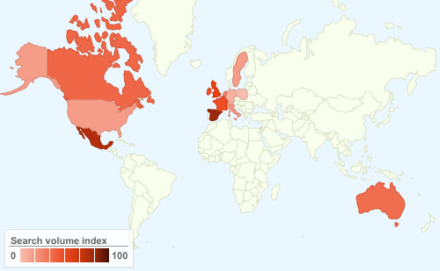A navigational query is one where the searcher knows where she wants to go to find something.
An informational query alternatively is one where the searcher knows what she'd like to do or find but does not know how this can be achieved.
Navigational queries come in two types:
- a word, name or brand strongly or uniquely associated with one particular web site: HP, ebay, hotmail, new york times, yahoo.
- a partial or complete web address: ebay.com, www.hotmail, yahoo.co
The 1st type is what is usually meant with navigational query.The 2nd type is called a URL query.
Both are re-finding queries geared to go back to a specific place vs. searching for something.
To make our conversation easy, we'll simply refer to al of these as navigational queries.
How Many Navigational Queries?
A lot.
A Yahoo study into re-finding behaviour (PDF) finds that as many as 40% of all queries are re-finding queries.
24% of all queries, it finds, are truly navigational queries.
To get a sense of the size and significance of that volume, compare it with informational queries where Google estimates 20-25% of its searches are new ones while analysis of 3 months of AOL search data shows 59% of all queries are unique.
Navigational Queries & SEO
Navigational queries, it seems, are the one single query you can predict for a web site. Every day someone out there will try to access your site using either all or part of its URL or your (unique) brand name via a search.
A navigational query is treated pretty much the same way as an informational one: a search is a search. (although Google does like to show site links for navigational queries)
For example, where Google used to try to take you to the URL you entered in their search, they now search the web for the occurrences of the address you typed. (Note: the behaviour in the toolbar is still one where it emulates the address bar)
That translates into:
- 1 search
- from 1 person
- wanting to go to 1 site (yours)
- presented with at least 10 sites to go to...
In other words, the two keywords you can be certain of that will be used a lot to find you, your site name and brand name, have to show you as result #1.
You also have to maintain that position. From Information Re-Retrieval: Repeat Queries in Yahoo’s Logs (PDF):
"More critically, we observed that when the searcher clicked on a previously viewed result, the time it took to make the click was significantly longer if the rank of the result had changed in the meantime. This suggests that changing the rank of a result can lead to noticeable changes in user behavior [...]"
Also, check the amount of text that shows up for a typical navigational search for your site/brand. According to Microsoft eye tracking research (PDF), users pay more attention to the URL displayed in navigational results but start focusing more and more on the snippet the longer that becomes.
Navigational Queries, SEM & Reputation Management
With this in mind we can't help but come to the next conclusion: you should own the (navigational) search result page for your site name and brand name.
Owning this page naturally increases the chance the searcher will land on one of our properties -- but it also reinforces the idea, the image, the perception, of your site as an Authority. Safe. OK. A site of Internet fame and therefor trust worthy.
For example, a Google search for Microsoft has Microsoft owned properties appear 9 times while Google's obligatory injection of at least 1 Wikipedia mention is something that can easily be, if not owned, controlled by Microsoft.
Not owning this result page can be cause for the need for reputation management.
A navigational search for PayPal, for example, has damning entries on the page:


Where Do Navigational Queries Come From?
Typical navigational queries come more or less evenly from everywhere.
Looking at 3 common navigational queries combined -- ebay, hotmail, and microsoft -- we see a pretty even spread across the USA:

It's fun, in a geek kind of way I guess, to repeat those searches to get a world-wide picture. Spain, Mexico and the UK, for example, are the top searchers for Hotmail:

Who is searching most for your site, your brand, where and what is your strategy to help these people meet their expectations?

